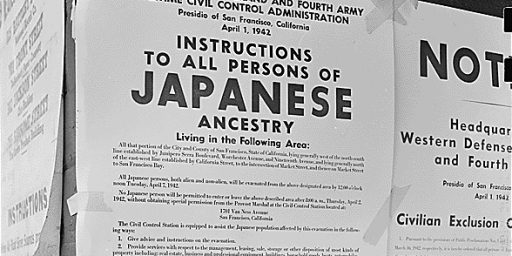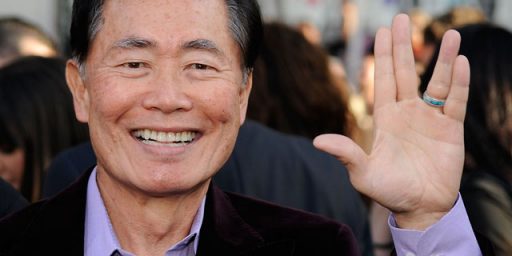George Takei On Loving America, Even Though It Treated You Horribly
I ran across this post regarding a TED Talk by George Takei at Vox after I published the post on American exceptionalism and, it struck me that it hits all the points I was talking about:
Shortly after the Japanese attack on Pearl Harbor, hysteria against Japanese Americans was at an all-time high. Many Americans saw their fellow citizens of Japanese descent as potential traitors. That hysteria reached a critical point when President Franklin Roosevelt ordered Japanese Americans on the West Coast into internment camps.
A few weeks after his fifth birthday, Takei and his family were abruptly taken from their homes. They were put in trains, and they were shipped — without charges or trial — to an internment camp. Takei described it, “I still remember the barbed wire fence that confined me. I remember the tall sentry tower with the machine guns pointed at us. I remember the searchlight that followed me when I made the night runs from my barrack to the latrine. But to five-year-old me, I thought it was kind of nice that they’d lit the way for me to pee. I was a child, too young to understand the circumstances of my being there.”
After the war, Takei and his family were released with a one-way ticket to any place of their choice. Penniless, they went back to Los Angeles and were forced to rework their entire lives from scratch in impoverished conditions. The conditions were so bad, Takei explained, that his sister once asked to go back “home,” which, at the time, meant the internment camp that once imprisoned them.
(…)
It was a tough, conflicting journey for Takei. But he said that, eventually, it defined his own brand of patriotism: to love his country, through good and bad, to make it a better place.
“I am dedicated to making my country an even better America, to making our government an even truer democracy,” Takei said. “And because of the heroes that I have and the struggles that we’ve gone through, I can stand before you as a gay Japanese-American — but even more than that, I am a proud American.”
There’s something extraordinary about someone who has been put through the absolute worst by our government who is still able to maintain a love for their country, while acknowledging its flaws. Takei isn’t alone in this attitude, of course, the Japanese-Americans who fought in Europe during World War II, including the late Senator and winner of the Congressional Medal of Honor Daniel Inoyue, demonstrated the same thing. So have countless numbers of African-Americans who fought for, and sought to better, their country despite what had been done to them and people like them.
If there is any kind of American exceptionalism we should embrace, its the kind that creates people like this.
Here’s the video of Takei’s talk, it’s only 15 minutes and well worth watching:






My old dentist grew up in an interment camp but he too loved America. He once got up a 2 in the morning to treat this blond haired blue eyed Swede’s tooth ache.
Takei is truly a giant in contemporary American society.
I recently learned the Canadians did the same thing to their Japanese but somehow managed to be even more cruel by demanding of their interred relocation east of the Rockies or repatriation to Japan. And their policy didn’t officially end until 1949. It is amazing the reverence shown when your country would do something like that to you.
The men of the 442nd were recruited out of the internment camps.
Good message and good post, thanks.
despite it’s flaws there’s not many places people would choose to live in.
@Dave D:
I had no idea that the Canadians had done this too
Kind of blows your mind, doesn’t it? I mean, imagine being the guy who said “right, let’s recruit soldiers from the camps.” Did this guy figure that it was a perfectly normal thing to do? Was he squeemish about it? I wonder. I don’t think I’d have the chutzpah to attempt something like that.
And it worked!
…
Also, I too didn’t know the Canadians pulled the same thing (or even worse). I can’t say it really surprises me, though.